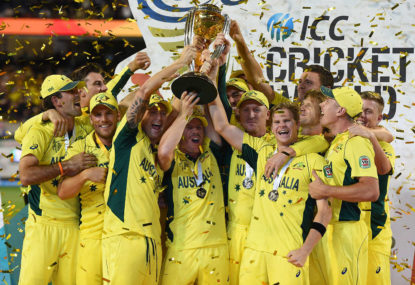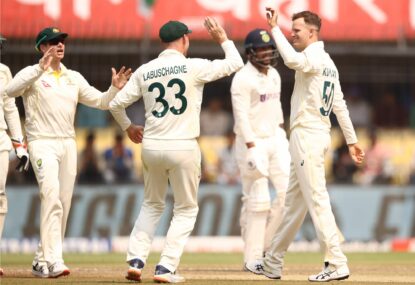Club cricket finals. The World Twenty20. It’s that time of year where, at both ends of the talent spectrum, the cricketing roulette of knockout stages is upon us.
The dawn of another knockout tournament, the World T20, brings with it a mixture of thrill, hope and an all too familiar sense of impending despair. That, at least, is the case if you are a supporter of England’s male sporting teams (and, I am reminded, Australia’s T20 team).
This year we celebrate (or mourn?) the 50th year that’s passed since England’s male footballers managed to win one of those shiny World Cups, despite 12 attempts since. The baby boomer generation tell us fondly of this fine day. Successive generations are yet to experience anything like it.
For many, it’s just one of those things. Some teams, or nations, no matter how well their form is approaching World Cups, or knock-out tournaments, just can’t seem to win the damn thing.
In men’s cricket, South Africa and England have long held the tag of ‘chokers’. India and Australia, by contrast (T20 cricket aside for the latter) are known to exceed expectations on the big stage – they’re big game players. The question, therefore, – is this innate, do Indians have a natural predilection to outperforming their naysayers? Have they a sense of one-upmanship that we English simply don’t possess? Or is it something that can be taught, practised and prepared for, and which India therefore do so in a superior manner?
The answer, like most things, is probably a mixture of both, but it begs the question. Are the likes of England, South Africa – the world’s ‘chokers’ – doing enough to overcome this flaw?
It’s not just international tournaments. This year’s Big Bash League in Australia saw the team which qualified for the semi-finals in last position, Sydney Thunder, win the whole thing. In fact, in the five-year history of the tournament, no team that finished top of the ladder has actually won it outright. The fourth placed team has won it twice, as has the third placed team, and the second placed team only once, when Perth Scorchers won it last year. It’s almost an inverse relationship – the narrower the margin with which a team sneaks into finals, the more likely they are to capitalise on the opportunity.
Psychology, evidently, plays a big part. Cricket, as we are constantly told, has a far larger psychological element than most sports. It’s also a bunch of individuals purporting to play for a team, with the reliance on those key individuals ‘showing up’ on the day being far greater than any invasive team sport.
Still, psychological components do not categorically equate to factors beyond our control. Certainly, there are some uncontrollables; one view is that it’s the experience that counts, but that this in itself presents a viscous cycle. If a team reaches a knockout stage they acquire valuable experience in doing so. If they don’t reach these stages, they won’t gain the experience for the next time, and if they don’t have the experience, they’re less likely to succeed compared to the teams that do. Stay with me.
Evidently, there are uncontrollables. There’s also a braying media eager to denounce and tag any team they possibly can with that of ‘chokers’. It has a nice ring to it, and it’s easy to write about.
“There’s also the obvious angle of Australia being hopeless in T20 cups in the past… Everyone likes talking about that,” the editor suggests as I pitch this week’s theme.
That aside, there are psychological elements that can, and should, be addressed. All teams at international level, after all, possess a psychologist, or have access to one. It’s a recognised factor, but one that, in my experience, focuses on the most part on the individuals. The question here is how much the psychology of a team, as a whole, is addressed, and could and should the likes of England’s men be doing more.
True, there is a cheering confidence around the England men’s team. With a straight-talking captain and exciting young players without the scars of failed campaigns past, theirs is a can-do, can-win mentality. What of looking at other sports however, for further advice?
Kevin Pietersen posts regularly on social media about how much practicing his golf swing has improved his cricketing equivalent. Golf, he claims, has made him hit a cricket ball harder. It’s well-documented too that Ricky Ponting often played some of his best cricket after a week not spent in the nets but mastering the various holes on the nearest golf course.
The benefits of improving coordination and technique are often talked of, but rarely do we hear of the benefits of the knock-out mentality that golf brings.
Sports such as golf and tennis are sports which at the highest level are played exclusively through elimination rounds. These are sports in which the high individual pressure thrust upon cricketers can relate to, and ones which offer the perfect platform from which to learn.
Perhaps professional cricketers regularly converse with their tennis and golf-playing counterparts, but if so it would appear on a casual basis. How about making it a proper thing? Surrounding teams with individuals who have been there, done that and withstood the pressure might just be the next best thing to having the experience of having done it themselves.
Pietersen was refused the opportunity to return to the England fold as a player last year, but offered instead to be a mentor to those that were. The benefits of being able to pick the brains of the most brash, confident and outright successful Twenty20 player in the world are beyond measure.
The KP saga continues and, once again, one can’t help thinking it could have been handled far, far better, whether for the use of Pietersen’s on or off-field talents.
The answer to how to prepare to succeed in elimination phases of high pressure tournaments won’t be found in this article. Suggestions, yes, but this merely postures – the formula must be left to the professionals. However while there remains an element of ‘nurture’ in learning how to win knockout stages, one wonders whether more should, and could, be done.





































































































